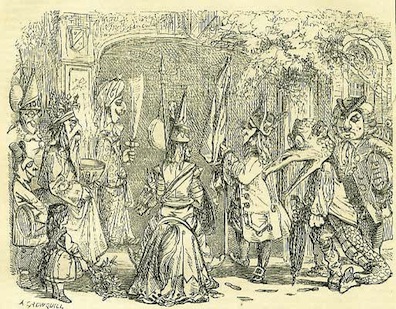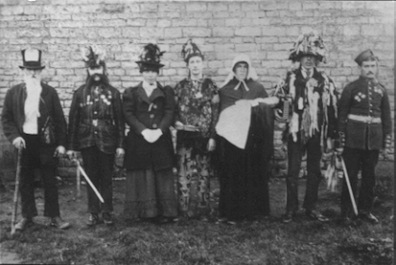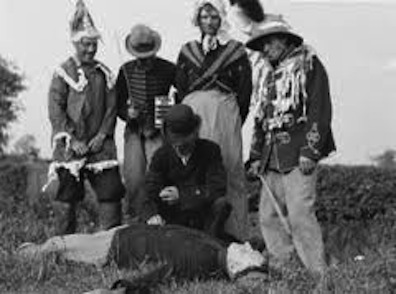In Telemachus, Scylla and Charybdis, and
Oxen of the Sun Mulligan calls Stephen "A lovely
mummer!...the loveliest mummer of them all!"; "O, you peerless
mummer!"; "Mournful mummer"; "Mummer's wire." Joyce's
annotators have been curiously reluctant to gloss this term,
suggesting that its provenance and implications are not easy
to identify. The farthest most will go is to make it
synonymous with "actor." But there is one particular
theatrical tradition that seems to have given rise to the
term. Mummers were, and in some places still are, impromptu
comic actors who performed in the streets, in inns and public
houses, and in visits to private houses, just as carolers and
trick-or-treaters do. Their performances typically revolved
around a story of death and resurrection: the young hero is
killed, and a quack doctor revives him.
Neither Gifford nor Johnson provides a definition of the
word. Kiberd, intriguingly, says that a mummer is an "actor,
specifically one who takes part in a mumming-show," begging an
obvious question to which he does not provide an answer.
Mysteriously, he adds, "perhaps a vaguely homoerotic appeal is
suggested." Slote quotes the OED: "'One who mutters or
mumbles'; also a contemptuous term for an actor." [2025]
Adding to these definitions, Slote, Mamigonian, and Turner
note the interesting fact that, according to Gogarty's Many
Lines to Thee, "'Mummers' was Joyce's 'name for Yeats'
players in the Irish National Theatre'."
Kiberd's reference to "a mumming-show," perhaps informed by
personal Irish experience that the other annotators lack,
touches on a tradition of amateur theatrical performance that
may have some relevance to Ulysses. Mumming derived
from secular folk plays in the Middle Ages, related to other
carnival rites like morris dances
but distinct from church-sponsored theatrical events like
mystery plays. Begging was often involved: performers would
visit great houses, usually just before or just after
Christmas, expecting to receive handouts. Masking too played a
part: cognates of “mummer” in various medieval languages
(Middle English, Middle Dutch, Early New High German, Old
French) carried the principal meaning of wearing a mask or
disguise. These comic performances were still going strong in
the British Isles in the late 19th and early 20th centuries,
though it seems that the tradition has weakened considerably
since then.
Mulligan feels an affinity for these impromptu clowners. In
Scylla and Charybdis he declares that "I have
conceived a play for the mummers," and launches
into the very funny title page of a lewd skit. The spirit of
mummery informs his impromptu comic skits here and elsewhere
in the novel (imitating priestly rites, pretending to be a
dildo, taking on the person of Jesus Christ, speaking as a
professor of Celtic antiquities, founding a fertilizing farm
for barren females). It is not so clear, however, why he would
call Stephen a lovely mummer. For most of the book Stephen is
painfully serious. Even the wry telegram that makes Mulligan
call him "peerless" shows little genius for comic
improvisatory clowning. The flashes of humor that periodically
break through the dark clouds of Stephen's rumination are
typically wry and ironic—hardly the stuff to please a crowd.
With the onset of drunkenness
in Oxen of the Sun, however, Stephen becomes
funnier, and he taps the same comic veins that Mulligan
enjoys: blasphemous mockery of religion, and crude
celebrations of carnality. His wild ramblings in this episode
are quite cerebral (his audience is learned), and they are
filtered through the medium of the episode’s ornate prose
narration. But Circe provides something closer to
his words as he performs a little skit for Lynch and the
whores. After Bella objects to some lewd jokes, Lynch says,
“Let him alone. He’s back from Paris,” and Zoe, “O go
on! Give us some parleyvoo.” “Stephen claps hat on
head and leaps over to the fireplace, where he stands with
shrugged shoulders, finny hands outspread, a painted smile
on his face,” and performs a hilarious imitation of a
Parisian hawker enticing passersby to enter an establishment
and see a sex show.
This lewd performance may not correspond to any dialogue ever
heard in a holiday play, but it does display Stephen in the
mummer's mode of comic improvisation. And, intriguingly, Circe
reaches its climax in a series of events that reproduce the
central action of many mummers’ plays: the death and
resurrection of the hero. Stephen is knocked flat on his back
by a British soldier. As action swirls over his prostrate
body, the funeral home worker Corny Kelleher, “weepers
round his hat, a death wreath in his hand, appears among the
bystanders” and offers to carry Stephen on the cart in
which he has just ferried two lechers to Nighttown. It appears
finally that his assistance will be unnecessary: “Ah,
well, he’ll get over it. No bones broken. Well, I’ll shove
along. (He laughs) I’ve a rendezvous in the
morning. Burying the dead. Safe home!" Stephen,
then, escapes the honor of being ferried to Glasnevin cemetery
by Corny, as Paddy Dignam was on the morning of June 16. If
Joyce was familiar with the tradition of mumming, it is hard
to imagine that he would not have made the connection to what
happens to Stephen.
In an unpublished doctoral dissertation (Purdue University,
1989) titled
James Joyce: “The loveliest mummer of them
all,” Frances Jeanette Fitch argues that Stephen’s
mumming is displayed in his Shakespeare talk in
Scylla and
Charybdis. She also connects the tradition to Stephen’s
name, observing that December 26, the most common day for
mummery in Ireland, is not called Boxing Day in that country
but... St. Stephen’s Day.


